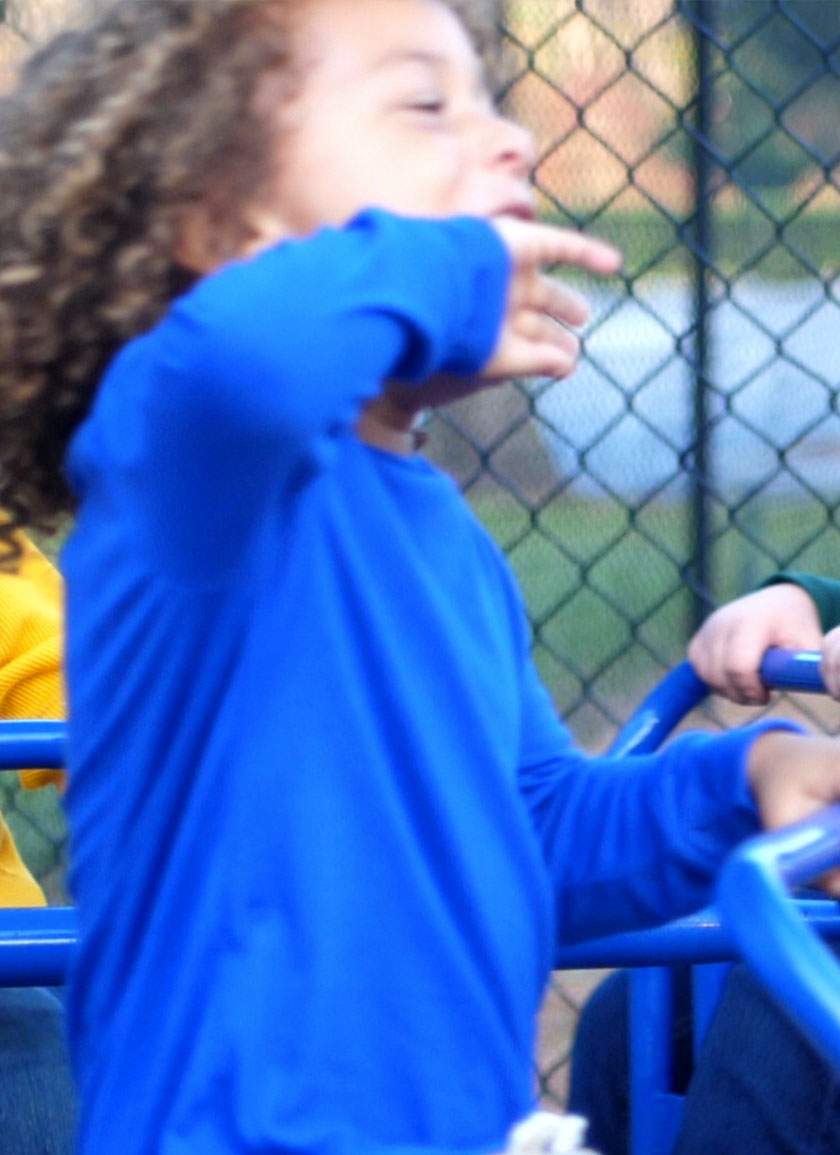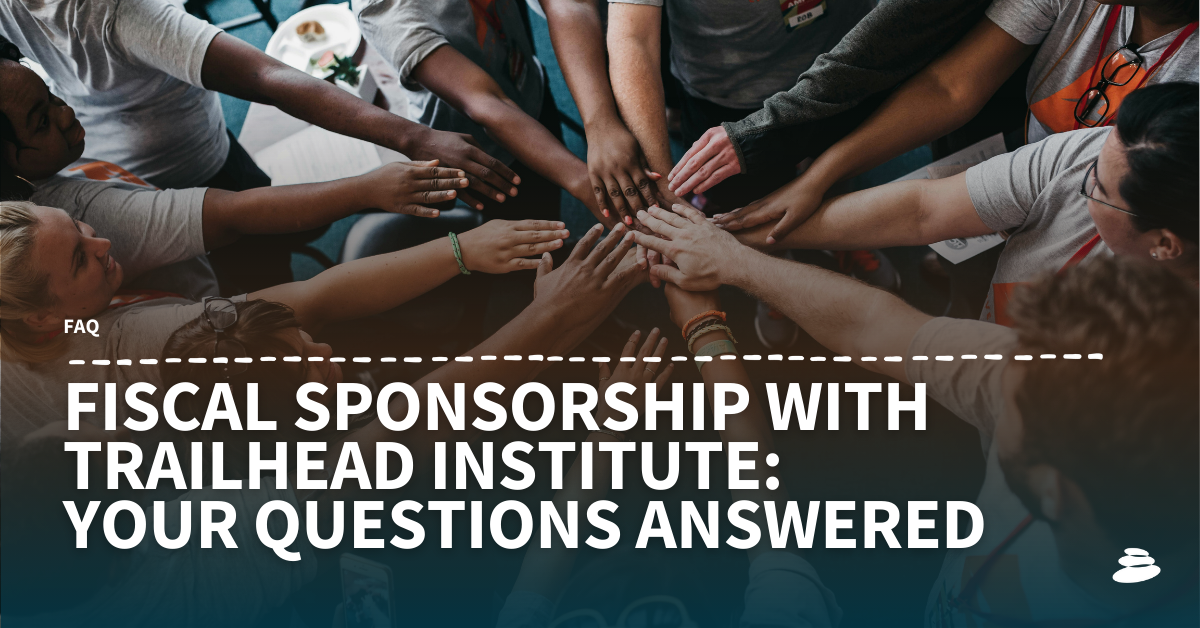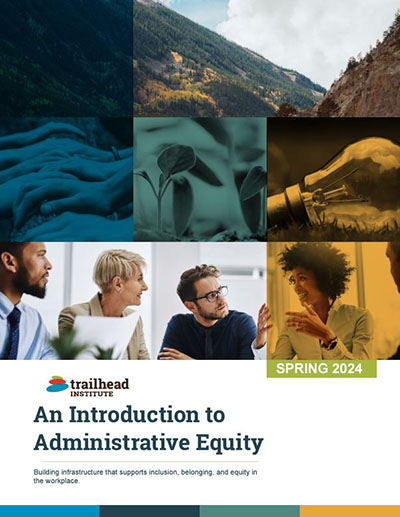
Administrative Partnership Program
Overview
At Trailhead Institute, we serve as a flexible and strategic administrative partner for fiscal sponsorship and operations support for individuals, organizations and Collaboratives. Our approach allows partners to leverage our back office services while maintaining full control over their projects. We differ from a traditional Fiscal Sponsorship because we focus on collaboration, capacity, and justice in partnership.
We see our work as being a partnership rather than a transaction, which is why we call all our sponsored projects Administrative Partners. We believe that by investing time, energy and passion into partnerships from the early stages, we can help build skills to expand administrative capacity for the long term. Our approach provides partners the ability to leverage our fiscal and operational services while maintaining full control over their work.
Trailhead was founded in 1993 as the Colorado Foundation for Public Health and the Environment to meet a need for fiscal management of funds coming from the Colorado Department of Public Health and the Environment and out into communities. The fiscal sponsorship arm within Trailhead was officially coined as the Administrative Partnership Program in 2017, and has served as Trailhead’s flagship offering since the organization’s inception.
Through the Administrative Partnership Program, Trailhead serves as a flexible and strategic administrative partner, providing fiscal sponsorship and operations support to individuals, organizations, and collaboratives.
Partners may be unincorporated entities, a 501(c)(3), or an LLC in need of an administrative partner, with or without funding in hand, on a specific grant or project. Trailhead’s approach allows Administrative Partners to leverage the organization’s back office services while maintaining full control over their projects.
Managing the fiscal and administrative responsibilities of a public health initiative can be a complex and time-consuming burden that diverts precious staff and resources away from an organization’s core efforts and objectives. By investing time, energy, and passion into these partnerships and organizations from the early stages, our Administrative Partnership Program helps build partner’s resources to think strategically and expand their administrative capacity for the long term.
Trailhead’s Administrative Partnership Program is focused on addressing the stark disparity between communities and community-based organizations (CBOs), and larger academically and professionally seasoned organizations, and their ability to independently secure, manage, and administer large grant funds.
This inequity results in a decreased capacity for communities and CBOs to implement innovative, community-informed programs designed specifically to address each communities’ unique needs.
As we continue to build our capacities, it is our goal that we are able to build yours in turn! Through our Administrative Partnership Program online portal, we provide partners with resources and opportunities (such as funding, coalition building, and training) as well as personal, financial, and contractual information.
Interested in Becoming an Administrative Partner?
Watch our pre-screening webinar to learn more about Trailhead’s approach to fiscal sponsorship and receive application instructions.
Our Current Administrative Partnership Program Partners
Active Living
ARISE Beyond Barriers stimulates a holistic, healthier and happier community of people with disabilities by utilizing and providing recreation, social events, life coaching and peer counseling.
FIT & NU® is a dedicated online health and wellness club that focuses on helping women of color overcome limiting beliefs and unhealthy habits unique to our community and escape the cycle of dieting. Our culturally responsive FITness, NUtrition, and disease prevention programs, challenges, and resources are designed to create sustainable change for a lifetime.
Behavioral Health, Mental Health & Wellbeing
Affinity Consulting works to enhance the content for curriculum designed to promote relational, financial, mental, and personal well-being.
Community-Centered Trauma Solutions (CCTS) provides culturally responsive services and workshops for individuals and communities affected by trauma and vicarious trauma. CCTS fosters recovery through personalized, compassionate, and whole-person care—uplifting individuals as they rebuild strength, connection, and hope.
iSafe improves the physical and mental health of immigrant and refugee survivors through trauma-informed programming.
LinkAGES was founded in 2018 with a vision of preventing or reducing social isolation in Colorado through meaningful connections across ages. Through a collaborative of members and strategic partners, LinkAGES strives to make intergenerational programming the norm by building capacity, facilitating collaboration and raising awareness of the power of intergenerational connections.
Michelle Simmons Counseling Group (MSCG) is dedicated to providing warm and engaging mental health counseling services to individuals and families from diverse backgrounds. MSCG empowers healing and growth by offering evidence-based counseling in a compassionate and trauma-informed manner.
The Preservatory is an urban alternative suicide awareness and prevention nonprofit, offering programs constructed of the elements of hip-hop culture, and an alternative healing program and network for mental and overall health, including healing retreats.
Civic Engagement
Brújula Comunitaria is a community organization led by Latina women, founded in 2021, that strengthens the leadership and resilience of Latino families through collaborative programs, civic engagement, and community power building. Through these actions, Brújula empowers its members and their networks to develop strong leadership skills, enabling them to take initiative in their communities and beyond, advancing collective action and creating lasting systemic change.
The Colorado Youth Advisory Council (COYAC) gives Colorado teens ages 14-19 a voice in the state lawmaking process. The Colorado State Legislature created COYAC with House Bill 08-1157 to “examine, evaluate and discuss the issues, interests, and needs affecting Colorado youth now and in the future, and to formally advise and make recommendations to elected officials regarding those issues.”
Economic/Workforce Development
The Colorado Equitable Economic Mobility Initiative (CEEMI) is an independent nonprofit, working with public and private partners to create a more equitable economic ecosystem, by:
- Enrolling Coloradans facing poverty in employment pathways at scale
- Selecting programs based on rigorous evidence (sustained earnings, etc.)
- Connecting our siloed workforce development system
- Blending public, private, and philanthropic funds (with a central focus on public funds) to connect learners with the supports they need to thrive.
The Wezesha Dada Center (WDC) empowers women entrepreneurs, facilitates investment in communities, and closes wealth disparities for women, BIPOC and marginalized communities. WDC offers programs in four (4) strategic areas:
- Business-related education and training;
- Connecting clients to financial resources and capital;
- Peer-to-peer referral, support, and connection; and
- Self-empowerment education, training, and resources focused on health, well-being, safety, family, and work-life balance.
Environmental Health
Red Star International is an Indigenous-led nonprofit organization dedicated to building connections with Indigenous communities to expand mindsets, evolve practices and realize a collective vision of health and wellness.
Family Programs
Bold Steps is a supportive initiative focused on advancing the wellbeing and long-term stability of teen parents, with a particular emphasis on those impacted by foster care. Through housing, mentorship, practical education, mutual care support, and community-based workshops, Bold Steps seeks to equip young families with the tools, relationships, and resources needed to navigate adversity and build thriving futures.
Deshaciendo Nudos. Untangled (DNU) is a non for profit organization providing education and courses of action to achieve a fairer, more equitable, and healthier life. DNU works to improve people’s communication skills at all levels: intrapersonal, intergenerational, interpersonal, and intercultural.
They work with individuals, families, educational entities, organizations, and governments to educate on simple, courageous, and compassionate communication. Their programs include individual appointments, family sessions, workshops, support groups, and courses to meet each person’s needs and plant the seed of clear communication so we all can meet our needs, project our dreams, and achieve our goals.
La Piñata del Aprendizaje is a program built by community for community. Their unique approach has evolved from their lived experiences and is focused on addressing the real needs of families living in areas at risk of high needs.
The curriculum they have developed addresses the parent as the child’s first teacher. La Piñata del Aprendizaje evaluates the children in these 5 key developmental areas: Communication, Fine Motor Skills, Gross Motor Skills, Socialization, and Problem Solving and Independence. Their curriculum empowers the entire family in helping their children, ages 0-5, in achieving proficiency in these areas while at the same time addressing their basic needs.
The Ancestry Research Training (ART) Project educates about the importance of genealogy research among communities of color to stay connected to one’s heritage and roots. ART also supports youth and communities of color in learning entrepreneurship and life saving skills.
Food Access & Nutrition
Bondadosa was created in 2017 with an electric grocery-delivering tricycle and a goal to build an innovative, kind, and inclusive food system that serves everyone. Since then, they’ve created groundbreaking partnerships to put healthy food on more tables by teaming up with small businesses, food producers, nonprofits, government agencies, and organizations to fight hunger in Colorado communities.
What started as a five-year action plan to address hunger has grown into a multigenerational, multicultural food movement powered by and for the people who grow, produce, sell, eat, advocate for, and care about food. Provecho Collective, formerly Colorado Blueprint to End Hunger, invites us all to have a voice at the table in shaping Colorado’s food system. They convene partners, support local solutions, strengthen resources, and champion bold policy change to build a better food system for everyone in Colorado.
Learn more about Provecho Collective and their experience with fiscal sponsorship in their partner profile.
Food Security Network (FSN) focuses on hunger as a public problem and uses community organizing, network development, and collaborative actions to advance transformative solutions across systems. FSN’s approach centers power and participation with directly affected community members.
The Jefferson County Food Policy Council (JCFPC) envisions Jefferson County as a food-secure community with food access for all residents; a robust, equitable farming infrastructure; and a thriving local food economy.
Learn more about JCFPC and their experience with fiscal sponsorship in their partner profile.
Mountain Roots Food Project’s mission is to cultivate a resilient food system in Gunnison Valley by enhancing healthy connections between earth, food, and community. They are partnering with Trailhead to place AmeriCorps members in rural counties of Southwestern Colorado who will address rural capacity issues with a focus on community food security through education and outreach.
The Safe and Abundant Nutrition Alliance (SANA) is working to expand the local farm-to-food pantry system that provides produce, meat and eggs to local food pantries.
Sharing Our Blessings Food Pantry are a blessed group of bilingual friends providing food and educational resources to those facing hunger and living below the poverty line. They are committed to fostering self-sufficiency within diverse communities in Colorado.
Health Navigation & Service Coordination
Arts & Wellness was formed in 2015 to bring awareness to a potential silent killer – cervical cancer. They are a grassroots, faith-based project. Arts & Wellness develops and implements plans to increase the rate of cervical cancer screenings, increase awareness and the importance of HPV vaccination, and increase vaccination rate for adolescence children. Through participation in 9 Health Fairs (9HF), they’ve helped screen over 450 women for cervical cancer.
GRASP, or “Guiding Researchers and Advocates to Scientific Partnerships,” is a patient-led program that connects and empowers patients, clinicians, and researchers. GRASP’s mission is to facilitate bidirectional learning opportunities, acknowledging the unique expertise patients bring to research. Through initiatives such as Poster Walkthroughs at major cancer conferences, Huddles around important cancer research topics, and a registry for advocate-researcher connections, GRASP serves cancer scientists, clinicians, and patient advocates.
Learn more about GRASP and their experience with fiscal sponsorship in their partner profile.
iNOW supports three important strategies for achieving a collective goal of immigrant integration: navigation, outreach, wealth-building. iNOW implements these strategies by bridging the interests and needs of grass tops and grass roots organizations and communities. iNOW focuses on the intersection of evidence-based pathways to integration for immigrant populations (in particular refugees) in Metro Denver. These integration pathways mirror social determinants of health and include: Employment and economic sufficiency; Education and training; Child’s education; Physical health & well-being; Housing; Social bonding; Social bridging; Language and cultural knowledge; Safety and stability; Civic engagement.
Morgan County Interagency Oversight Group Committee serves the needs of Morgan County youth and families by coordinating innovative services.
The NCR HCC facilitates the opportunity for health care partners to share best practices, develop networking relationships and enhance collaboration and communication for the purpose of increasing the ability of the health care delivery system to prepare for, prevent, mitigate, respond to and recover from any and all emergencies.
Northeast Region Healthcare Coalition (NERHC) supports healthcare organizations, public health departments and coordinates with emergency management agencies to prepare for, respond to, mitigate, and recover from disasters by promoting integration, collaboration, information sharing, and resource support in the region.
The Partnership for Community Action (PfCA) is a grassroots movement building a vibrant community for 2SLGBTQIA+ and Gender-diverse people in rural Colorado. PfCA creates safe, affirming spaces, coordinates events and educational opportunities, and provides essential support, resources, and advocacy to strengthen identity, cultivate belonging, and empower a resilient, inclusive future.
The Patient Navigation and Community Health Worker Training Collaborative (PNCT) provides national leadership for the development, education, standardization and sustainability of the growing patient navigation workforce. Patient navigation is a form of intervention in which a patient navigator assists individuals in accessing health services during an episode of care by minimizing potential barriers. Patient navigators may focus on patients with particular health care conditions or during other phases of care ranging from prevention to end of life. They are widely used in hospitals, community health centers and, increasingly, in community-based agencies. The goals of the PNCT are to accomplish the following:
- Create and deliver the coursework necessary for developing a competent patient navigator workforce.
- Provide expertise in the effective dissemination of the patient navigator intervention.
- Disseminate the evidence base of Patient Navigation to community, academia and public health professionals.
Prosperando is a project working to improve the care of Latinos and other racial and ethnic groups who have kidney disease through curriculum development and education among patient navigators.
The South Region Healthcare Coalition is a collaboration of health and medical partners working together to mitigate against, prepare for, respond to, and recover from emergencies through planning, training, exercising, communicating, and relationship building.
The Light Collective supports a trusted health community-driven and health community-governed online collective for peer support groups sharing health journeys, curated content, and research, and connecting individuals, including patients, caregivers, and clinicians.
Together We Prosper’s mission is to improve the health and well-being of communities by addressing the social determinants of health through innovative programs and partnerships, fostering thriving communities where all can reach their full potential.
Homelessness
Elevated Denver is a nonprofit devoted to humanizing the issue and implementing new solutions driven by diverse stakeholders and our homeless neighbors. The end goal is a more effective and responsive system that meets peoples’ needs so they can move into stable housing more efficiently.
Public Safety & Crisis Response
Denver Alliance for Street Health Response’s (DASHR) mission is to create and support community-based responses to crisis and conflict as a way to ensure public health and safety. DASHR was initially founded as a coalition to bring an alternative crisis response to Denver, Colorado, and expanded its work to align with a new narrative around what public health and safety can look like for our communities, which include meeting basic human needs such ending housing and food insecurity.
Youth & Young Adult Programs
Advocates 4 ALL Youth, Inc. is a non-profit organization dedicated to improving mental health literacy in communities by offering an evidence-based program for youth.
Apprentice of Peace Youth Organization’s (AOPYO) mission is to reduce mental health stigmas with the incorporation of leadership, arts, wellness, and skilled trades throughout all programs. AOPYO teaches practices and principles that allow young people through adults to express their true nature by discovering their own unique path through embracing life’s journey.
CHARGE for Positive Youth Development (CHARGE PYD) works across the six counties of southeast Colorado. It started out using the County Health Rankings to determine major health issues in the region and then applied the Community Guide to determine what efforts would be most feasible and meaningful to the communities. Youth sexual health was identified as a key area of focus and additional funding has helped to support efforts to address this issue. Creating cultural change within these rural, tight-knit communities requires trust and understanding of the community. A youth empowerment model has allowed CHARGE to be successful in starting conversations around these issues in areas where they previously did not exist.
Hampden Farms cultivates inclusive, joyful communities by supporting neurodiverse individuals and families through innovative, hands-on programs. They empower people of all abilities to thrive-whether through creative play at Denver Brick Club, therapeutic garden experiences, or accessible digital storytelling. Their mission is to foster belonging, creativity, and lifelong learning for neurodivergent and underrepresented communities in Denver and beyond.
An Introductory Guide to Administrative Equity
Trailhead’s approach to administrative partnership is focused on reducing and eliminating barriers to accessing information and financial resources for community-based partners. In 2024 Trailhead released a framework on Administrative Equity that introduces practices, procedures, and considerations for public health organizations to implement equitable administrative operations.
Focusing on Operational Structures
The framework focuses on recommendations for infusing equity within finance, contracts and procurement, and human resources functions to make administrative systems more just and responsive to employees and communities, and ensure that organizational structures promote belonging and inclusion in the workplace.
Our Graduated Administrative Partnership Program Projects
- Black Business Initiative (BBI)
- Colorado Prevention Alliance
- Empowered Healthcare
- Farm to School Task Force
- The King’s Council
- La Cocina
- Postpartum Wellness Center of Boulder
- Project Belay
- Project Protect Food Systems
- Regional Institute for Health and Environmental Leadership (RIHEL)
- Rocky Mountain Public Health Education Consortium
- Spanish/English Promotora Training Community Outreach: Cancer Focus
- Study to Explore Early Development (SEED)
- Systems of Care Initiative
- VUELA for Health



